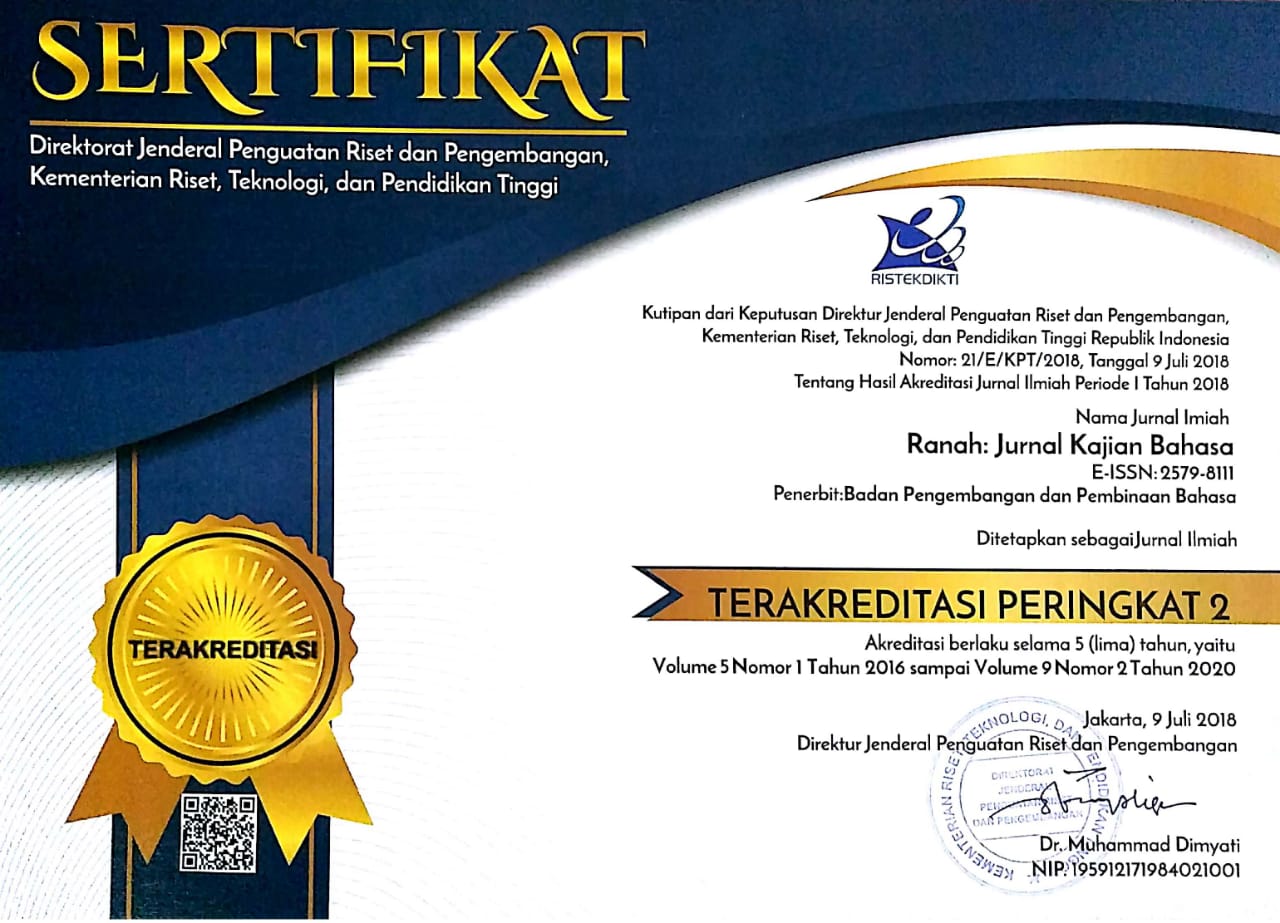Kekerasan Simbolik Terhadap Karakter Homoseksual dalam Novel Lelaki Terindah karangan Andrei Aksana
Abstract
Homosexuality is a controversial topic in Indonesia because Indonesia is considered as a conservative country concerning one’s sexual preferences. This social phenomenon is binding as it restricts the identity construction of sexual preferences in Indonesia. Relating it to literary arena, this issue is addressed in several Indonesian literatures by Indonesian novelists like Ayu Utami, Djenar Mahesa Ayu, Ratih Kumala and Andrei Aksana. Taking Aksana’s novel Lelaki Terindah as the object of the study, this paper analyses (1) how symbolic violence operates in the novel (2) how this novel resists the hetero-normativity in Indonesia. The library study is taken to deepen the analysis. The finding shows that (1) the form of symbolic violence is represented with the normalisation of the LGBT characters. (2) This novel also challenges the concept of Indonesian heteronormativity by representing the LGBT character and rising the issue about homosexuality in Indonesia.
Abstrak
Homoseksualitas selalu menjadi topik yang kontroversial di Indonesia karena Indonesia dianggap sebagai negara yang cukup konservatif terutama menyangkut preferensi seksual seseorang. Fenomena sosial ini tentunya bagi sebagian orang dianggap mengikat dan membatasi pilihan seksual seseorang. Dalam kaitannya dengan kesusastraan, tema homoseksualitas ini diangkat oleh beberapa novelis dalam karya sastra mereka, seperti Ayu Utami, Djenar Mahesa Ayu, dan Andrei Aksana. Novel Lelaki Terindah karya Andrei Aksana diambil sebagai obyek studi untuk penelitian ini dengan menganalisis (1) bentuk kekerasan simbolik dalam novel ini dan (2) bagaimana novel ini menentang heteronormativitas di Indonesia. Melalui metode studi pustaka, peneliti mendapati bahwa (1) bentuk kekerasan simbolik dalam novel Lelaki Terindah direpresentasikan dengan bentuk penormalan identitas seksual pada karakter LGBT. (2) Novel tersebut juga merupakan bentuk penentangan terhadap konsep heteronormativitas di Indonesia dengan menampilkan karakter LGBT dan mengangkat isu mengenai homoseksualitas yang ada di Indonesia.
Keywords
Full Text:
PDF (Bahasa Indonesia)References
Aksana, A. (2004). Lelaki Terindah. Jakarta: Gramedia Pustaka Umum
Ayu, D.M. (2005). Nayla. Jakarta: Gramedia Pustaka Utama
Angelianawati, D and Schmidt, L. (2017). Discourses of Homosexuality on the Indonesian Television: HISKI Seminar Nasional Proceeding. Yogyakarta: Komisariat HISKI Sanata Dharma University, 2017, p. 24-28.
Badan Pengawas Keuangan dan Pembangunan (BPKP). "Undang-undang Republik Indonesia No. 44/2008 mengenai pornografi, p.2." BPKP. Diambil dari sumber: http://www.bpkp.go.id/uu/filedownload/2/33/151.bpkp pada tanggal 23 Juni 2020
Badan Pengawas Keuangan dan Pembangunan (BPKP). "Undang-undang Republik Indonesia No. 44/2008 mengenai pornografi, p.10." BPKP. Diambil dari sumber: http://www.bpkp.go.id/uu/filedownload/2/33/151.bpkp. pada tanggal 23 Juni 2020
Bennet, L. (2005). Women, Islam and Modernity: Single Women, Sexuality and reproductive Health in Contemporary Indonesia. London: Routledge.
https://doi.org/10.4324/9780203391389
Blackwood, E. (1995). Senior Women, Model Mothers and Dutiful Wives: Managing Gender Contradictions in a Minangkabau Village. Berkeley: University of California Press.
Blackwood, E. (2007). Regulation of Sexuality in Indonesian Discourse: Normative gender, Criminal Law, and Shifting Strategies of Control. Indiana: Department of Sociology and Anthropology, Purdue Univ. https://doi.org/10.1080/13691050601120589
Butler, J. (1990). Gender Trouble: Feminism and the Subversion of Identity. NY: Routledge Classic.
Boellstorf, T. (2005) The Gay Archipelago: Sexuality and Nation in Indonesia. Priceton: Princeton Univ. Press.
https://doi.org/10.1515/9781400844050
Boellstorf, T. (2005) "The Emerge of Political Homophobia in Indonesia: Masculinity and National Belonging." Routledge Ethos Journal, vol 69:4. https://doi.org/10.1080/0014184042000302308
Boellstorf, T. (2007). A Coincidence of Desires: Anthropology, Queer Studies, Indonesia. Durham: Duke Univ. Press.
https://doi.org/10.2307/j.ctv125jthx
Bourdieu, P. (2003). Language and Symbolic Power. Massachusetts: Harvard University Press.
Chang, E. (2007). "Artist to participate in LGBTQ film festival parade." Artikel Bilingual terbit tanggal, 27 Oktober 2017.
Cochran. S. (2017). Proposed declassification of disease categories related to sexual orientation in the International Classification of diseases and related health problem. Geneva: Bulletin of World Health Organisation terbit tanggal17 Juni 2017. WHO International bulletin, diambil dari sumber : http://www.who.int/bulletin/volumes/92/9/14-135541.pdf pada tanggal 23 Juni 2020
Diamond, LM., & Butterworth, M. (2008). Questioning Gender and Sexual Identity Over Time to Time. Sex Roles: A Journal for Research Vol. 59. https://doi.org/10.1007/s11199-008-9425-3
Dearden, Lizzie. (2017). "Sharia Court in Indonesia Sentences Two Gay Men to 85 Lashes Each after being Caught Having Sex".https://www.independent.co.uk/news/world/asia/islamic-court-indonesia-gay-men-85-lashes-sex-caught-homosexuality-laws-first-time-khairil-jamal-a7740626.html diunduh pada tanggal 10 Agustus 2019.
Foucault, M. (1990). The History of Sexuality, vol. 1: An Introduction. Robert Hurley, trans. New York: Vintage Book
Foucault, M (1998). Power and knowledge. New York: Random House USA, Ic.
Gayatri, B.J.D. (1993). Coming Out but Remaining Hidden: Portrait of Lesbian in Java. Paper presented at the International Congress of Anthropological and Ethnological Sciences. Mexico: Mexico City.
Nicolosi, J. (1991). "Reparative Counseling of Male Homosexuality: A New Clinical Approach". Northvale, NJ: Jason Aronson. http://citeseerx.ist.psu.edu/viewdoc/download?doi=10.1.1.471.9777&rep=rep1&type=pdf diunduh pada tanggal 10 Agustus 2019.
Oetomo, D. (2001). "Giving the Voice to Those who Cannot Speak. Yogyakarta: Galang Press.
Robinson, K. (2001). "Gender, Islam, and Culture in Indonesia. Monash: Monash Asian Literature.
Utami, A. (2015). Saman. Jakarta: Kepustakaan Populer Gramedia, 2015
USAid Reports. (2014). "Being LGBTQ in Asia: Thailand country report." UNDP. Diambil dari sumber: https://www.usaid.gov/sites/default/files/documents/1861/Being_LGBTQ_in_Asia_Thailand_Country_Report.pdf pada tanggal 23 Juni 2020
USAid Reports. (2014). "Being LGBTQ in Asia: Indonesia country report." UNDP. Diambil dari http://www.asiapacific.undp.org/content/dam/rbap/docs/Research%20&%20Publications/hiv_aids/rbap-hhd-2014-blia-indonesia-country-report-english.pdf pada tanggal 23 Juni 2020
Yulius, H. (2016). Review: Queer Indonesian's constant search for home and belonging. An article written for Inside Indonesia. Diambil dari sumber https://www.insideindonesia.org/review-queer-indonesians-constant-search-for-home-and-belonging diunduh pada tanggal 10 Agustus 2019.
DOI: https://doi.org/10.26499/jentera.v9i1.1740






















